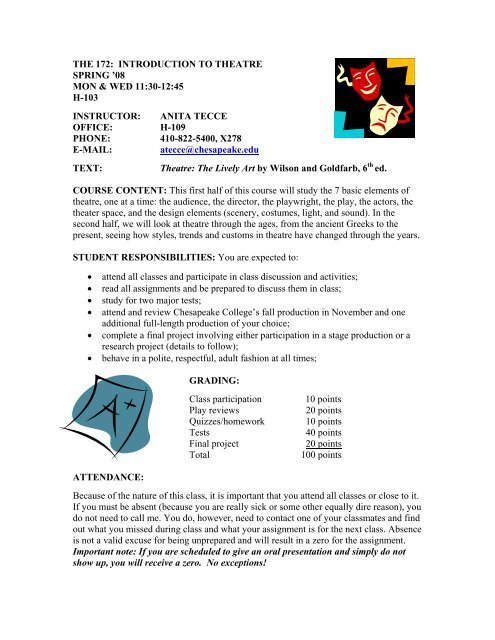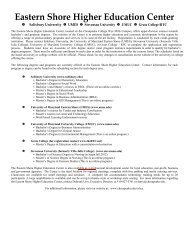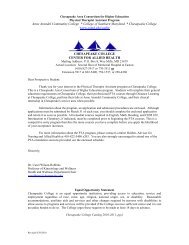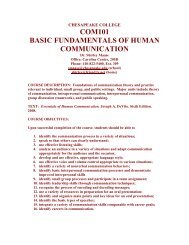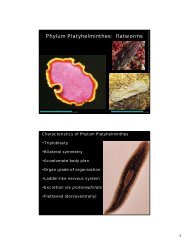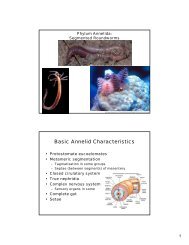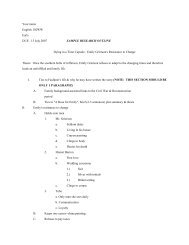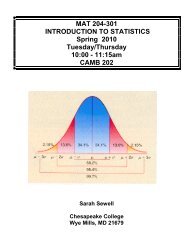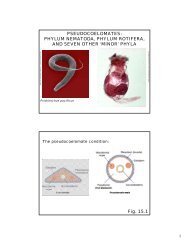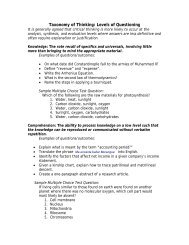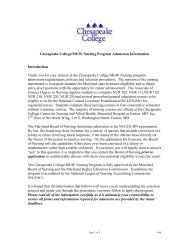INTRODUCTION TO THEATRE - Chesapeake College
INTRODUCTION TO THEATRE - Chesapeake College
INTRODUCTION TO THEATRE - Chesapeake College
You also want an ePaper? Increase the reach of your titles
YUMPU automatically turns print PDFs into web optimized ePapers that Google loves.
THE 172: <strong>INTRODUCTION</strong> <strong>TO</strong> <strong>THEATRE</strong><br />
SPRING ’08<br />
MON & WED 11:30-12:45<br />
H-103<br />
INSTRUC<strong>TO</strong>R: ANITA TECCE<br />
OFFICE: H-109<br />
PHONE:<br />
410-822-5400, X278<br />
E-MAIL: atecce@chesapeake.edu<br />
TEXT:<br />
Theatre: The Lively Art by Wilson and Goldfarb, 6 th ed.<br />
COURSE CONTENT: This first half of this course will study the 7 basic elements of<br />
theatre, one at a time: the audience, the director, the playwright, the play, the actors, the<br />
theater space, and the design elements (scenery, costumes, light, and sound). In the<br />
second half, we will look at theatre through the ages, from the ancient Greeks to the<br />
present, seeing how styles, trends and customs in theatre have changed through the years.<br />
STUDENT RESPONSIBILITIES: You are expected to:<br />
• attend all classes and participate in class discussion and activities;<br />
• read all assignments and be prepared to discuss them in class;<br />
• study for two major tests;<br />
• attend and review <strong>Chesapeake</strong> <strong>College</strong>’s fall production in November and one<br />
additional full-length production of your choice;<br />
• complete a final project involving either participation in a stage production or a<br />
research project (details to follow);<br />
• behave in a polite, respectful, adult fashion at all times;<br />
GRADING:<br />
Class participation<br />
Play reviews<br />
Quizzes/homework<br />
Tests<br />
Final project<br />
Total<br />
10 points<br />
20 points<br />
10 points<br />
40 points<br />
20 points<br />
100 points<br />
ATTENDANCE:<br />
Because of the nature of this class, it is important that you attend all classes or close to it.<br />
If you must be absent (because you are really sick or some other equally dire reason), you<br />
do not need to call me. You do, however, need to contact one of your classmates and find<br />
out what you missed during class and what your assignment is for the next class. Absence<br />
is not a valid excuse for being unprepared and will result in a zero for the assignment.<br />
Important note: If you are scheduled to give an oral presentation and simply do not<br />
show up, you will receive a zero. No exceptions!
EXPLANATION OF GRADING AND ASSIGNMENTS<br />
CLASS PARTICIPATION (10 points):<br />
This grade includes both attendance and contribution to<br />
the class. You will lose 5 points (out of 100) from this<br />
grade for each absence beyond the first, which is free. If<br />
you do not participate in class or if your effect on the<br />
class is negative rather than positive, you will also lose<br />
points on this portion of your grade.<br />
PLAY REVIEWS (20 points):<br />
You are required to attend and review two performances this semester, one at <strong>Chesapeake</strong><br />
and one additional review of a full-length play at another college, community theater, or<br />
professional theater. (No high school shows, musical revues, children’s theatre or<br />
church presentations, please.) Performance dates for the <strong>Chesapeake</strong> show are given<br />
later in this syllabus. PLEASE ARRANGE YOUR SCHEDULE <strong>TO</strong> FIT IN ONE OF<br />
THESE PERFORMANCES AS SOON AS NECESSARY. Your <strong>Chesapeake</strong> review<br />
should consist of 6 sections: Introduction, Acting, Directing, Script, Design elements, and<br />
Conclusion. Your second review will have a 7 th section: Brief Plot Summary<br />
Your review will be delivered orally. A written version (typed, two page minimum, not<br />
counting the plot summary) will also be handed in. Your first review will be given on<br />
Mon., April 7th and the second on Mon., April 28th. There are no make-ups for the<br />
oral part of review! Late written reviews may be handed in for a possible 50 points.<br />
TESTS (40 points):<br />
You will have two major tests, one on the elements of theatre and one on the history of<br />
theatre. They will be mostly multiple choice, with one essay question on each. Each test<br />
will count for 20% of your grade. You should take notes on<br />
everything covered in class and be sure to STUDY your notes<br />
and your textbook for both tests. You will not be able to do<br />
well on the test simply by being in class or by osmosis. YOU<br />
MUST STUDY. If you must miss a test, you must contact me<br />
immediately. You will only be given a make-up if you have a<br />
really good, verifiable reason for missing the test and if you<br />
request a make-up. You will lose 10 points for each day of<br />
lateness (including non-class days). Once the tests have been<br />
returned and gone over, there are no more make-ups.
QUIZZES/ HOMEWORK (10 points):<br />
You will have several quizzes and homework assignments<br />
of various types throughout the semester, which will be<br />
averaged to form this part of your grade. Late assignments<br />
will be accepted but points will be lost.<br />
FINAL PROJECT (20 points):<br />
You have 3 choices for a final project. You have until Feb. 13 th to decide which one you<br />
would like to do and let me know in writing. Here are your choices:<br />
• Participate either on-stage or backstage in <strong>Chesapeake</strong><br />
<strong>College</strong>’s production this semester. Remember that this<br />
requires a major commitment and a lot of your time, but it is<br />
also fun and rewarding. After the production, you will be<br />
expected to give an oral presentation to the class, telling us<br />
about your experiences.<br />
• Form a group of 4 or 5 students and create a scene to perform<br />
for the class at the end of the semester. This will involve<br />
writing the scene, performing it, directing it, gathering<br />
costumes, preparing props and scenery, doing lights, etc. The<br />
scene should be about 10-15 minutes. If you choose to do this one, please see me for<br />
necessary paperwork and due dates. You will be expected to give an oral presentation<br />
to the class after your performance, telling us about your experiences.<br />
• Do research on one of the topics covered in class (see attached list of suggested topics<br />
later in this syllabus) and prepare a presentation. It should include:<br />
• 3-4 pages of text<br />
• photos, illustrations, charts, etc.<br />
• video or Power Point (optional)<br />
• at least 5 sources<br />
• a handout for all members of the class summarizing your<br />
report<br />
A list of suggested topics is attached. You will present during the<br />
last week of classes or on final exam day, depending on the topic<br />
you choose. Your report should be between 10 and 15 minutes.<br />
Do NOT merely repeat what we’ve already discussed in class or<br />
what is in your textbook. Your job is to ADD to our knowledge<br />
and understanding of your subject. This is a MAJOR project and<br />
should be thorough and well prepared. Power Point is highly<br />
recommended.
EXTRA CREDIT:<br />
If you choose to, you may earn extra credit in two ways:<br />
You can see additional plays and write additional reviews.<br />
Ten points will be added to one of your grades for each<br />
review, up to a total of 3 (30 points).<br />
You may also earn extra credit by participating in any area<br />
of theatrical production. You will receive five points for every hour you spend on the<br />
<strong>Chesapeake</strong> <strong>College</strong> spring production. You may do any of the following:<br />
• attend auditions<br />
• play a part as an “extra”<br />
• work with lights or sound<br />
• work on props or set<br />
• serve as an understudy at rehearsals<br />
• assist with set construction<br />
• paint or wallpaper<br />
• watch rehearsals<br />
• sell tickets and refreshments at performances<br />
• assist with load-in and/or strike.<br />
You MUST keep track of your extra credit hours in a journal, along with a brief<br />
explanation of what you did, what you experienced, and what you learned, and have<br />
each entry SIGNED by me or another person approved by me. Each entry should be at<br />
least one hand-written page. If you do not have proper documentation and a signature,<br />
you will NOT receive credit for the work you have done. You will receive 5 points on<br />
one of your grades for every hour you work, up to a total of 10 hours (50 points).<br />
Please understand that extra credit points are NOT added to your final grade. That would<br />
be ridiculous. They are added to ONE of your grades. For example, if you are unhappy<br />
with a test grade of 60, you can spend an hour watching auditions and an hour helping<br />
build the set and bring your test grade up to 70. Another hour spent watching a rehearsal<br />
and one additional play review and your test grade is now an 85<br />
It takes a LOT of extra credit to make a difference in your final grade. The rule is: 10<br />
extra credit points will add 1 point to your final grade.<br />
IMPORTANT NOTE: You may NOT use the same role in the same production for<br />
more than one of the above assignments. For example, if you serve as Stage<br />
Manager for a show, you may use that experience for your final project, but you<br />
may not use it for extra credit. However, if you serve 2 functions in a production—<br />
for example, if you are the Stage Manager AND also work on painting the set—you<br />
may use the set-painting hours as part of your extra credit hours.
ANOTHER IMPORTANT NOTE:<br />
Dishonesty will not be tolerated!<br />
Any student who submits work that is not his own will receive a<br />
zero for that assignment. DO NOT attempt to review a play<br />
that you have not seen! You will be busted and receive a zero.<br />
CLASS CONTACTS:<br />
1. ___________________________________________________<br />
2. ___________________________________________________<br />
REMEMBER: This is a “fun” class and involves a lot of<br />
participation from class members. Do not, however, make the<br />
mistake of thinking it is a “blow-off” course or an “easy A.” You’ll<br />
receive 3 college credits for this class and you will<br />
have to earn them, as with any other transfer level<br />
course. It is absolutely essential that you study for your tests, hand<br />
in your work, and take your presentations seriously or you will<br />
almost certainly fail. It is very easy to make an A in this class—<br />
however, it is also very easy to wind up with an F! Enjoy this class<br />
and have fun—but go for the A!
PEAKE PLAYERS<br />
FALL PRODUCTION DATES<br />
Auditions:<br />
DEATH OF A SALESMAN<br />
Wednesday, January 30th<br />
Thursday, January 31st<br />
4:00 P.M.<br />
Todd Performing Arts Center<br />
Performances:<br />
March 28 th , 29 th , 30 th<br />
April 4 th , 5 th , 6 th<br />
Fridays and Saturdays at 7:30 P.M.<br />
Sundays at 2:30 P.M.<br />
Todd Performing Arts Center<br />
General Admission: $12<br />
Students: $6<br />
<strong>Chesapeake</strong> <strong>College</strong> students: FREE<br />
FINAL GRADE CALCULATION:<br />
The number in parentheses is the number of possible points<br />
you can ea rn for that assignment. (100=10 points, 95=9½,<br />
90= 9, etc.) Keep t rack of your progress throughout the<br />
semester so that yo ur final grade does not come as a shock to<br />
you.<br />
Grading key: 90-100=A, 80-89=B, 70-79=C,<br />
60-69=D, below 60=F.<br />
Grade<br />
Points<br />
Class participation: (10) _____ _____<br />
Play reviews: (20)<br />
_____ _____<br />
Tests: (40)<br />
_____ _____<br />
Quizzes/homework: (10) _____ _____<br />
Final project: (20) _____ _____<br />
Extra credit (80): _____ _____<br />
<strong>TO</strong>TAL:<br />
GRADE:<br />
_____<br />
_____<br />
_____
TENTATIVE CLASS SCHEDULE<br />
WEEK 1 1/23 Course overview<br />
WEEK 2 1/28-30 Introductions<br />
Nature of theatre<br />
Elements of theatre<br />
Theatre vocabulary<br />
Chap. 1<br />
Chap. 1<br />
WEEK 3 2/4-6 The Audience<br />
Chap. 4<br />
The Actor Chap. 5<br />
WEEK 4 2/11-13 The Playwright<br />
Dramatic Genres<br />
FINAL PROJECT PROPOSALS DUE<br />
Chap. 6<br />
Chap. 7<br />
WEEK 5 2/18-20 The Director and the Producer<br />
Chap. 8<br />
Theater Spaces Chap. 9<br />
WEEK 6 2/25-27<br />
Designers: Scenery and Costumes Chap. 10<br />
Designers: Lighting and Sound Chap. 11<br />
WEEK 7 3/3-5 The House<br />
Profile of a Production Chap. 12<br />
TEST #1<br />
WEEK 8 3/10-12<br />
Greek Theatre Chap. 13<br />
Roman Theatre<br />
Chap. 13<br />
3/17-19 SPRING BREAK<br />
WEEK 9<br />
WEEK 10<br />
3/24-26 Asian and Medieval Theatre Chap. 14<br />
Renaissance Theatre in England Chap. 15<br />
3/31-4/2 Renaissance Theatre--Italy, France, Spain Chap. 15<br />
Restoration Through Romanticism Chap. 16<br />
WEEK 11 4/7-9 FIRST PLAY REVIEW<br />
Early Modern Theatre Chap. 17<br />
th<br />
WEEK 12 4/14-16 20 Century Diversity Chap. 18<br />
WEEK 13 4/21-23 Contemporary Trends<br />
TEST #2<br />
Chap. 19<br />
WEEK 14 4/28-30 SECOND PLAY REVIEW<br />
BEGIN FINAL PROJECTS<br />
WEEK 15 5/5 CONTINUE FINAL PROJECTS<br />
FINAL EXAM DAY (5/7)<br />
COMPLETE FINAL PROJECTS
RESEARCH PROJECT <strong>TO</strong>PICS AND SIGN-UP SHEET<br />
Use the following topics as a “ kickoff” for your project. Sign up for<br />
the topic you want and then present to me, in writing, a brief<br />
description of what your project will entail. Your proposal is due on<br />
Wednesday, February 13th. Your project is due the last class week of<br />
classes.<br />
I. The role of one of the following in theatre, the development of one of the following<br />
throughout the centuries, etc.:<br />
Audience<br />
______________________________<br />
Director<br />
______________________________<br />
Playwright<br />
______________________________<br />
Acting<br />
______________________________<br />
Types of theater spaces ______________________________<br />
Scene design<br />
______________________________<br />
Costume design<br />
______________________________<br />
Stage makeup<br />
______________________________<br />
Lighting design<br />
______________________________<br />
Sound design<br />
______________________________<br />
II. A study of one of the following types of play, a detailed study of one or more<br />
examples of the type of play, a detailed study of a playwright, a study of 5-10 different<br />
productions of one of the plays, etc.:<br />
Greek Theatre<br />
______________________________<br />
Oedipus the King ______________________________<br />
Roman Theatre<br />
______________________________<br />
Medieval Theatre ______________________________<br />
Elizabethan Thea tre ______________________________<br />
Shakespearean Theatre ______________________________<br />
Hamlet<br />
______________________________<br />
Othello<br />
______________________________<br />
Commedia dell’arte ______________________________<br />
Melodrama<br />
______________________________<br />
17 th century French Theatre ______________________________<br />
Moliere<br />
______________________________<br />
Tartuffe<br />
______________________________<br />
Realism<br />
______________________________<br />
A Doll’s House<br />
______________________________<br />
Naturalism<br />
______________________________<br />
American musical theat re<br />
Theatre of the absurd<br />
______________________________<br />
______________________________<br />
African-American theatr e<br />
Latino Theatre<br />
______________________________<br />
______________________________<br />
Death of a Salesman ______________________________


